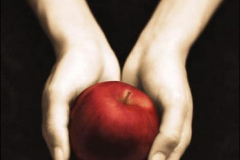Again.
So I’m looking through my stats and come upon the search phrase, “is there a correlation between mormons and vampires.”
Short answer: Yes.
Long answer: Just like every other organized religion on the planet. And those who submit and bare their necks to the teeth do so willingly. Or not. Maybe. Kinda sorta.

Faith—any faith, one that takes into account the possibility of a higher being—requires something of you. It asks you to believe in something you can’t see, can’t feel, can’t touch. Then it sets down the philosophies that this faith’s higher being represents. Further, it asks that you take these philosophies upon yourself; whether it asks you to simply believe them or live them or proselytize them is yet another philosophy it asks you to take upon yourself. Then it sets forth boundaries of behavior that you agree to in order to function within that higher being’s philosophical boundaries. And last, it may ask you to present yourself accountable to a human functioning as the higher being’s representative; if not a human, then to the higher being itself at some time in your future.
I know quite a bit about evangelicals. You know, born-again Christians: Southern Baptists. Pentecostals. Those folks. I know quite a bit about Mormons. You know, ’cause I are one. I don’t know much about anybody else.
Christianity generally asks you to believe the following:
- That a higher being (hereinafter referred to as God) created the world and humankind in 6 days (could be literal, could be metaphorical) with his hands.
- That he set up a number of rules (also known as the Law of Moses) for the people to follow.
- That he alternately rained death and destruction down on his chosen people or those who would slay his chosen people, depending on who pissed him off that day.
- That he asked his chosen people to slay a lamb as sacrifice and atonement for their sins.
- That he somehow magically impregnated a virgin with his divine baby-making matter so that the son she bore would be half-man, half-god (hereinafter referred to as Jesus) and therefore perfect.
- That he wanted Jesus (aka his son) to take over the whole sacrificial lamb gig so his chosen people wouldn’t have to do it by hand with an actual lamb anymore. And oh, this has the added benefit of saving everyone else who believes in him (Jesus), too. No more raining death and destruction on anyone. Jesus’s atonement for everyone’s sins makes him the savior of mankind.
- That God, Jesus, and a heretofore unmentioned wraith (hereinafter referred to as the Holy Spirit) form some sort of triad of purpose and/or existence.
Note: Evangelical Christianity (which is really what I’m talking about because that’s all I know outside my own faith) asks you to believe that these 3 entities are 1. Somehow. Like, a trichord in music, or an egg, or well, you know, anything with 3 distinct parts bundled up in 1 package. 3-in-1. This doctrine is hereinafter referred to as Trinitarianism.
- That God/Jesus/Holy Spirit set forth a new set of rules to follow, the first of which is to believe that Jesus died to atone for everyone’s sins.
Note: Evangelical Christianity is particular on this point, because it doesn’t matter how much other good stuff you do in the world, if you don’t get this first point down, you’re going to burn in a lake of fire for eternity. If you never had the opportunity to hear the gospel of the atonement (hereinafter referred to as the Good News), you’re going to burn in a lake of fire for eternity. Sorry ’bout that. And oh, if you profess belief after a life of absolute assholery, you’re going to heaven, so good on ya!
And what is heaven, by the way? What do you do there? You sing praises to God. You live in a mansion (the one that Jesus prepared for you) that is built on a street of gold. You wear a crown. The jewels in your crown denote HOW good you were. Is there a ghetto in heaven, where people who were assholes live? And wear nickel-plated steel crowns set with cubic zirconia?
And how do you manifest there? Are you the gender you are? (I’m told no; that you become some androgynous person mingling at the Great Cocktail Party in the Sky™). Are you married to your honeybunny there?
- To prove this measure of faith, you get dunked in some water to baptize you and cleanse you of all your sins. Metaphorically speaking.
- And also, that God asks you to tithe 10% of your earnings, however you define that.
Carrying on.
Mormonism asks you to believe points 1 through 10
Except for the side notes. We are generally silent on the subject of creation versus evolution. Quite frankly, I don’t know any Mormons who stress about this and I know quite a few (including me) who figure it could have been done any number of ways and in any number of combinations and are kind of scratching our heads over why creation and evolution seem to be mutually exclusive.
PLUS the following:
- That some specially dispensed Jews were asked of God to build a boat and head west about 2000 years before Columbus did and settle in (but arithmetic isn’t my strong point, so check me on that).
- That these people survived and thrived for a long long long long long time before being wiped out. But before they were wiped out, they scribed out their history on plates of gold.
- That somewhere in the early 1800s a kid by the name of Joseph Smith was visited by God and Jesus (who were, by the way, NOT 2-in-1) and given instructions as to the nature and history of the specially dispensed Jews, instructed to be their spokesperson by translating the golden plates, was visited by the Angel Moroni on a regular basis, received continuing revelation from God, and pretty much spread all this information around.
Note: At the time in history that this was happening, there were a lot of crackpot religious theories going around that people believed and wanted to believe and subscribed to; it was just that this one had a better marketing team.
- That polygamy was commanded of God and that the stoppage of polygamy was commanded by God. That blacks weren’t eligible to hold leadership positions in the church because of some holdover Victorian bullshit, but then they were. Yay! But we don’t talk about those, not really, no. It makes us uncomfortable, you see. Move along. Nothing to see here.
- That we make certain covenants with God (in our temples) that include things like giving your time and your talent and your resources to the building of the kingdom of God on earth, and well, chastity (meaning, if you’re single, don’t do it and if you’re married, only do it with your spouse). Okay. Well, that’s certainly groundbreaking. Welcome to Christianity 101.
- That when you get married in the temple (or re-married, which term is “sealed”), your marriage is for eternity as long as you obey God’s commandments and don’t break the covenants you made in #14. Also, any children you have are yours for eternity also (but there are THOSE days with the Tax Deductions when that’s not the most attractive thing in the world).
- That it is possible to become a god, with your own world(s).
Yeah, we’re not encouraged to talk about that in public, either, but hell, everybody BUT US talks about it and to me, this is THE selling point of the whole deal. Criminy! Can you imagine being imbued with all that knowledge and skill—and having a workshop big enough to create worlds and creatures? I’m so jumping through whatever hoops for the possibility of that kind of an eternity.
Mormons didn’t come up with this idea by a long shot; we simply actively, quietly really believe it. But really, I’m going to believe this is a possibility whether hoops are involved or not—because it suits my nature to believe this.
- That God has asked you to obey certain rules as a token of your faith.
- More rules.
- More rules.
- More rules.
Technically, we believe in salvation by grace. In practice … Not so much. The party line is: You are saved by grace after all you can do. But the “all you better do or else” starts adding up really fast.
The “or else” isn’t couched in terms of punishment because the concept of “hell” (the burning lake of fire kind) is a non-starter for us. It’s always couched in terms of rewards you will not have earned.
- That “every word that proceedeth out of the mouth of the prophet” is actually God’s words and not the prophet’s because heaven forbid a prophet remain fallible after he becomes the prophet. See 13a.
To summarize:
 Christianity in general asks you to believe a lot of weird shit.
Christianity in general asks you to believe a lot of weird shit.
Evangelical Christianity asks you to swallow the idea that there’s some kind of 3-in-1 thing going on with God; it also asks you to swallow that people who’ve never heard its doctrine are going to hell by default.
Mormonism (a Christian denomination, as noted by the words “Jesus Christ” in our official church name) asks you to swallow a whole boatload of other weirdness beyond what Christianity in general asks you to believe.
But the thing is, if you can swallow mere Christianity, if you buy into any belief system with a higher being who demands something of you, you’ve already tendered your neck to the fangs of religion. Religion is a vampire.
Which vampire bit you is kind of irrelevant once you’ve decided to submit.
But ours sparkle.





 Backstory: LDS fiction (aka Mormon fiction) is analogous to, say, what
Backstory: LDS fiction (aka Mormon fiction) is analogous to, say, what